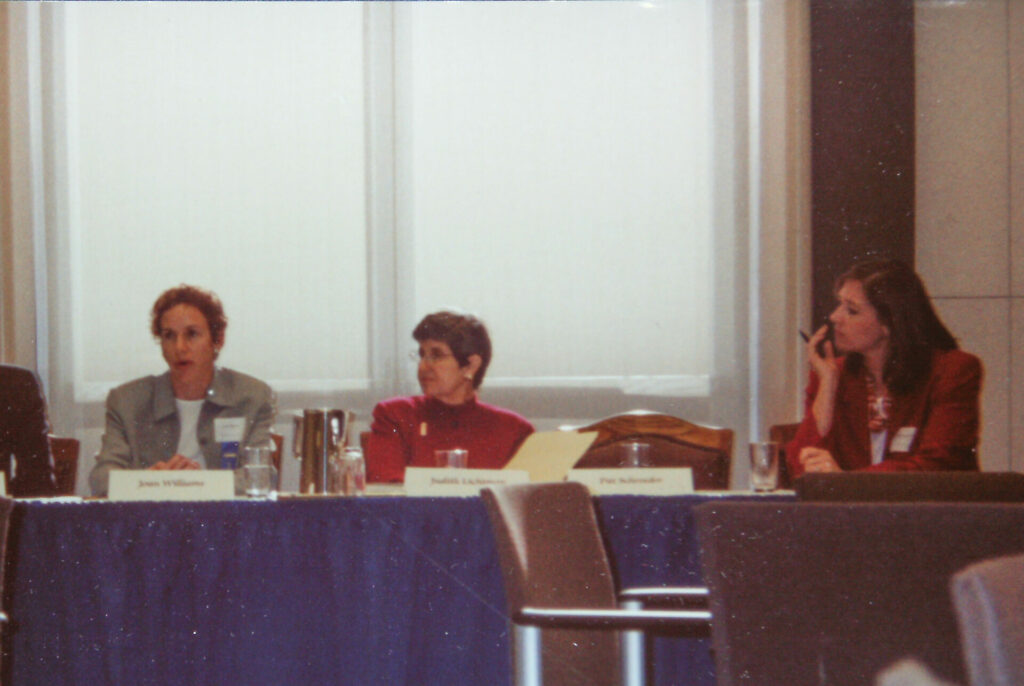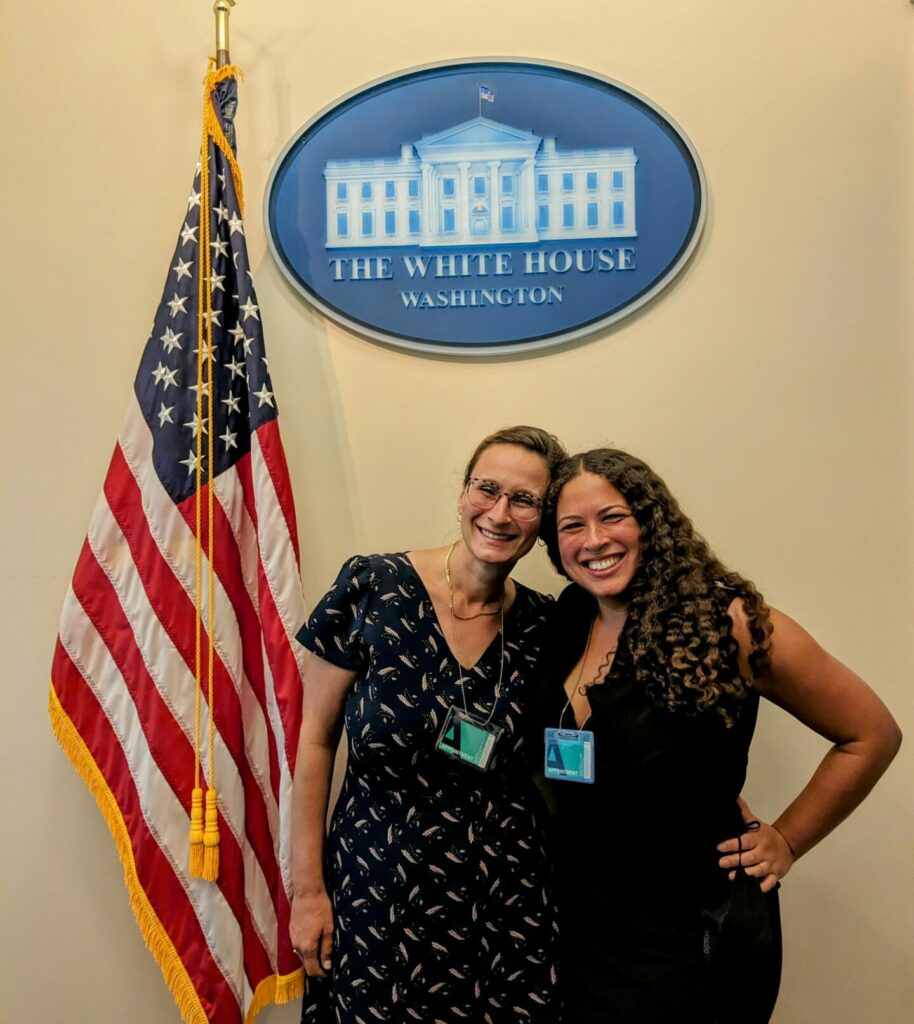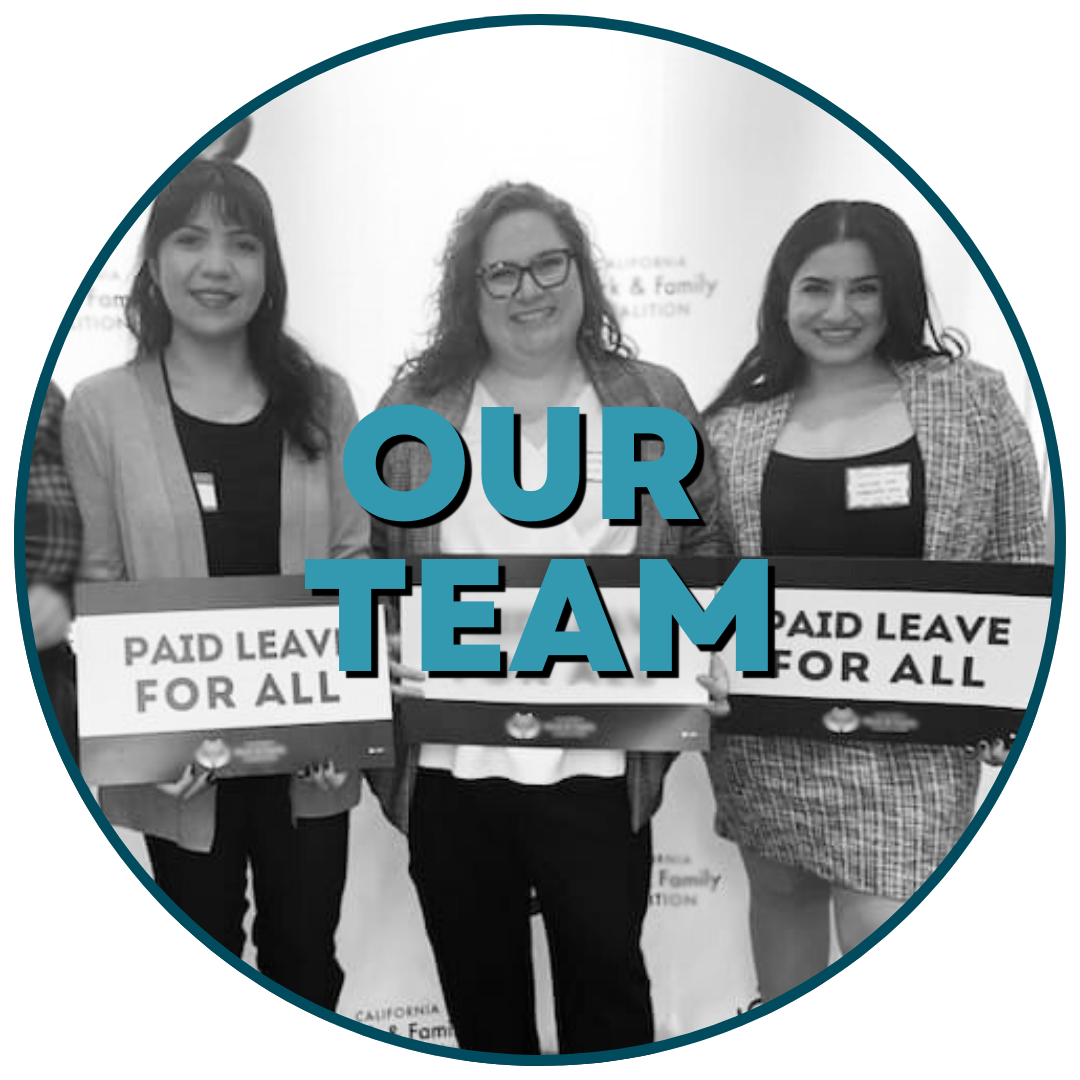Our History
For over 25 years, the Center for WorkLife Law has been a leading voice for economic justice and gender equity. Founded in 1998 by Joan C. Williams at American University and now affiliated with the University of California, College of the Law, San Francisco, WorkLife Law has transformed the landscape for caregivers and pregnant people in employment and education through groundbreaking advocacy, research, and legal work.

Joan C. Williams and Cynthia Calvert speak at an early WorkLife Law event in 1999.
Under founder Joan C. Williams’ visionary leadership, WorkLife Law redefined legal rights for working families, crafting novel legal theories and strategies that revolutionized how courts and employers approach discrimination against family caregivers. When WorkLife Law began its work, mothers were regularly being fired explicitly due to their parental status, with federal courts finding no legal recourse.
Williams’ landmark 2003 article “Beyond the Maternal Wall” changed this paradigm by establishing that discrimination based on motherhood constituted sex discrimination under Title VII of the Civil Rights Act. This legal theory was subsequently adopted by the Equal Employment Opportunity Commission in 2007 and again in 2023, leading to the recognition of a new area of anti-discrimination law, “family responsibilities discrimination” – a term coined by Williams and WorkLife Law’s current Senior Advisor Cynthia Calvert. WorkLife Law’s team literally wrote the book on family responsibilities discrimination and continues to train attorneys and enforcement agencies nationwide on this unique area of law. WorkLife Law also maintains a national database on legal protections for family caregivers, and shares its research and model legislation with advocates around the country, resulting in an ever-growing list of state and local protections. Today, thanks in large part to WorkLife Law’s research and advocacy, one-third of the American workforce is protected by laws that prohibit this form of discrimination.
The Center’s impact on the reproductive freedoms of workers has been equally significant. WorkLife Law was the first to advance the argument that pregnant workers had a right to workplace accommodations under the amended American with Disabilities Act and has used the theory to directly assist countless people. The Center played an instrumental role in the development of the Equal Employment Opportunity Commission’s early regulatory guidance establishing legal protections for pregnant, postpartum, and lactating workers. Through its Pregnancy Accommodation Working Group, WorkLife Law influenced obstetric clinical practice nationwide, leading to groundbreaking guidance from the American College of Obstetricians and Gynecologists on pregnancy and work. Most recently, the Center’s research and advocacy provided the foundation for the PUMP Act, a federal law that strengthened protections for lactating workers across the country and gave 9 million previously unprotected workers the right to lactation breaks and space. WorkLife Law also co-led national advocacy for protective federal regulations under the Pregnant Workers Fairness Act.
WorkLife Law’s practical research has changed the American workplace for the better. The Center pioneered studies on workplace bias against mothers, introducing the concept of “maternal wall bias” into public discourse. The 2006 report “Out or Pushed Out: The Real Story of Women and Work” presciently framed the narrative that would later explain the exodus of mothers from the workforce during the COVID-19 pandemic – not as a matter of choice, but as the result of hostile workplace conditions. “Poor, Pregnant, and Fired,” a 2011 report by then-WorkLife Law Deputy Director Stephanie Bornstein, helped shift the public narrative about “work-life balance” to focus more on the needs of working families. The Center’s research on work-family conflict among hourly workers, including the landmark 2018 Stable Scheduling Study, demonstrated that stable schedules for hourly workers not only improved workers’ health outcomes but also increased sales and labor productivity.
Dar a Luz: Legal Rights for Farmworkers during Pregnancy and Postpartum, a project founded in 2020 with WorkLife Law’s grassroots partner CAUSE, has helped California farmworkers avoid prenatal pesticide exposure and its devastating health consequences by changing government policies and medical practices to allow pregnant farmworkers to take paid leave. WorkLife Law has been on the front lines of breaking down barriers marginalized workers face in accessing paid leave and disability insurance, increasing access to these vital benefits for immigrants, indigenous language speakers, and underpaid workers in hazardous jobs.
In 2015, the Center expanded its work to include the rights of pregnant and caregiving students in higher education. Along with gender equity trailblazer Mary Ann Mason, WorkLife Law’s Williams and current Co-Director Jessica Lee launched The Pregnant Scholar, the nation’s first and only legal resource center dedicated to advancing the rights of pregnant and parenting students, who are predominantly people of color. The Pregnant Scholar has pulled the legal rights of pregnant and parenting students’ out of the shadows, resulting in new federal and state legal advances. Our model policies and compliance guidelines have been adopted at hundreds of educational institutions and organizations nationwide, impacting millions of students. The National Academies of Sciences Engineering and Medicine’s pathbreaking 2024 study report, Supporting Family Caregivers in STEMM, laid out a call to action based in large part on our contributions.

Liz Morris and Jessica Lee celebrating the passage of PUMP and PWFA at the White House in 2023.
In 2024, the Center entered an exciting new chapter of leadership as Joan C. Williams passed the mantle to new Co-Directors Jessica Lee and Liz Morris, who served as Pregnant Scholar Director and WorkLife Law Deputy Director, respectively, for a decade. Their partnership has proved transformative – together, they led a major expansion in services and number of people helped through WorkLife Law’s free legal helplines, changed public policy through model laws and cutting-edge research, and forged deep connections with government agencies, health care providers, and grassroots advocates.
Under Morris and Lee’s leadership, WorkLife Law continues its core mission while embracing an intensified focus on racial and reproductive justice and an expansive understanding of family and care. Their vision for the future is clear: a world where all people have the freedom to care for their loved ones and safeguard their reproductive health without jeopardizing their economic security.
Learn more about our team and key projects.
Our Mission
WorkLife Law is a national advocacy and research organization that advances gender and racial equity by strengthening legal rights for pregnant people and family caregivers. Our work seeks to ensure all people have the freedom to build and maintain economic security through employment and educational opportunities, without having to sacrifice their health or their loved ones’ care.
Our Model of Change
As an advocacy and research center affiliated with the University of California College of the Law, San Francisco, WorkLife Law uses three strategies to advance its mission: 1) promoting structural policy change at the state and national levels through innovative research, thought leadership, and grassroots partnerships; 2) offering direct assistance to workers and students facing discrimination; and 3) providing technical support to litigators and public agencies to expand legal rights for pregnant, postpartum, and caregiving students and workers.


